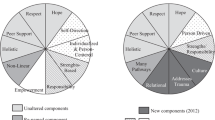Abstract
This preliminary study explored the perceptions of illness of people in a public hospital setting for treatment of bipolar disorder. Fifteen inpatients (5 African Americans, 5 Hispanics, and 5 European Americans) participated in audio-recorded, structured interviews. The interviews were designed to identify recurring themes and patterns in their perceptions of bipolar disorder and to assess their cognitive representations of the illness. The interviews were transcribed verbatim, and content analysis procedures were used to identify the illness perceptions and to compare them based upon ethnic orientation. Results indicated that most of the participants' group responses were more alike than they were different. However, discrete themes emerged among the individuals as their stories unfolded. These themes, and the perceived benefit of the interview itself, provide a beginning foundation for further research in the area, and have clinical relevance for health care providers working with this population.
Similar content being viewed by others
REFERENCES
Kleinman A: The Illness Narratives. New York, Basic Books, 1988.
Ghaemi SN, Stoll AL, Pope HG: Lack of insight in bipolar disorder. Journal of Nervous and Mental Disease 183:464–467, 1995.
Goodwin FK, Jamison KR: Manic-depressive Illness. New York, Oxford University, 1990.
Silverstone T, Romans-Clarkson S: Bipolar affective disorder: Causes and prevention of relapse. British Journal of Psychiatry 154:321–335, 1989.
Cox DJ, Gonder-Frederick L, Pohl S, et al: Diabetes, in Self-Management of Chronic Disease. Edited by Holroyd KA, Creer TL. Orlando, Academic Press, 1986, pp. 305–346.
Hilty DM, Brady KT, Hales RE:Areview of bipolar disorder among adults. Psychiatric Services 50:201–213, 1999.
Hampson SE, Glasgow RE, Toobert DJ: Personal models of diabetes and their relations to self-care activities. Health Psychology 9:632–646, 1990.
Buick DL: Illness representations and breast cancer: Coping with radiation and chemotherapy, in Perceptions of Health and Illness. Edited by Petrie KJ, Weinman JA. Amsterdam, Harwood Academic, 1997, pp. 379–409.
Hampson SE, Glasgow RE, Zeiss AM: Personal models of osteoarthritis and their relation to self-management activities and quality of life. Journal of Behavioral Medicine 17:143–158, 1994.
Moss-Morris R: The role of illness cognitions and coping with the aetiology and maintenance of the chronic fatigue syndrome (CFS), in Perceptions of Health and Illness. Edited by Petrie KJ, Weinman JA. Amsterdam, Harwood Academic, 1997, pp. 411–439.
Moss-Morris R, Petrie KJ, Weinman J: Functioning in chronic fatigue syndrome: Do illness perceptions play a regulatory role? British Journal of Health Psychology 1:15–25, 1996.
Petrie KJ, Weinman JA: Illness representations and recovery from myocardial infarction, in Perceptions of Health and Illness. Edited by Petrie KJ, Weinman JA. Amsterdam, Harwood Academic, 1997, pp. 441–461.
Scharloo M, Kaptein AA, Weinman JA, et al: Physical and psychological correlates of functioning in patients with chronic obstructive pulmonary disease. Journal of Asthma 37:17–29, 2000.
Graves JS: Living with mania: A study of outpatient group psychotherapy for bipolar patients. American Journal of Psychotherapy 47:113–126.
Leung SS, Steinbeck KS, Morris SL, et al: Chronic illness perception in adolescence: Implications for the doctor-patient relationship. Journal of Paediatrics & Child Health 33:107–112, 1997.
Kleinman A: Personal experience of illness, in The Handbook of Social Studies in Health and Medicine. Edited by Albrecht GL, Fitzpatrick R. London, Sage Publications Ltd, 2000, pp. 230–242.
Leventhal H, Diefenbach M, Leventhal EA: Illness cognition: Using common sense to understand treatment adherence and affect cognition interactions. Cognitive Therapy and Research 16:143–163, 1992.
Wichowski HC, Kubsch SM: The relationship of self-perception of illness and compliance with health care regimens. Journal of Advanced Nursing 25:548–553, 1997.
Lysaker PH, Bell MD, Bryson GJ, et al: Insight and interpersonal function in schizophrenia. Journal of Nervous and Mental Disease 186:432–436, 1998.
McEvoy JP, Freter S, Everett G, et al: Insight and the clinical outcome of schizophrenic patients. Journal of Nervous and Mental Disease 177:48–51, 1989.
David A, Van Os J, Jones P, et al: Insight and psychotic illness. British Journal of Psychiatry 167:621–628, 1995.
Fennig S, Everett E, Bromet EJ, et al: Insight in first-admission psychotic patients. Schizophrenia Research 22:257–263, 1996.
Greenfeld D, Strauss JS, Bowers MB, et al: Insight and interpretation of illness in recovery from psychosis. Schizophrenia Bulletin 15:245–252, 1989.
Linn EL: Relevance of psychotic patients “insight” to their prognosis. Archives of General Psychiatry 13:424–428, 1965.
Lam D, Wong G: Prodromes, coping strategies, insight and social functioning in bipolar affective disorders. Psychological Medicine 27:1091–1100, 1997.
Weinman J, Petrie KJ, Moss-Morris R, et al: The Illness Perception Questionnaire: A new method for assessing the cognitive representation of illness. Psychology and Health 11:431–445, 1996.
Leventhal H, Nerenz DR, Steele DJ: Illness representations and coping with health threats, in Handbook of Psychology and Health, vol. 4. Edited by Baum A, Taylor SE, Singer JE. Hillsdale, NJ, Lawrence Erlbaum Associates, 1984, pp. 219–252.
Hampson SE: Illness representations and the self-management of diabetes, in Perceptions of Health and Illness. Edited by Petrie KJ, Weinman JA. Amsterdam, Harwood Academic, 1997, pp. 323–347.
Hampson SE, Glasgow RE, Foster LS: Personal models of diabetes among older adults: Relationship to self-management and other variables. Diabetes Educator 21:300–307, 1995.
American Psychiatric Association: Diagnostic and Statistical Manual of Mental Disorders, 4th ed. Washington, DC, Author, 1994.
Miller DC: Handbook of Research Design and Social Measurement, 5th ed. Newbury Park, Sage, 1991.
Kubler-Ross E: On Death and Dying. New York, Macmillan, 1969.
Mattingly C: The concept of therapeutic ‘emplotment'.’ Social Science & Medicine 38:811–822, 1994.
Author information
Authors and Affiliations
Rights and permissions
About this article
Cite this article
Pollack, L.E., Aponte, M. Patients' Perceptions of Their Bipolar Illness in a Public Hospital Setting. Psychiatr Q 72, 167–179 (2001). https://doi.org/10.1023/A:1010371626859
Issue Date:
DOI: https://doi.org/10.1023/A:1010371626859




